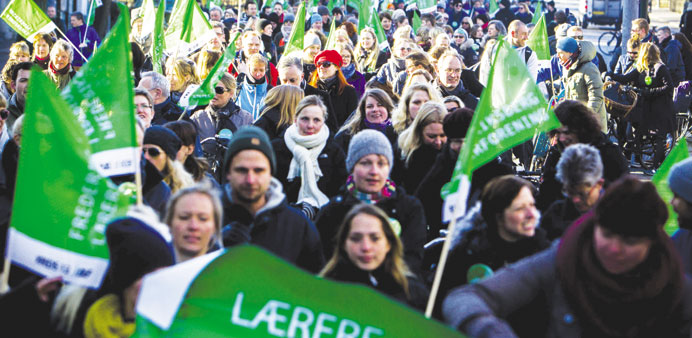People demonstrate yesterday in front of the Frederiksberg City Hall in Copenhagen against the lockout of all teachers in public schools in Denmark.
AFP/Copenhagen
Almost 900,000 Danish pupils were unable to attend classes yesterday as 60,000 primary school teachers were locked out in a dispute with local governments over teaching reforms.
Banner-bearing teachers stood outside most schools as a trickle of parents and pupils arrived, with many of the 875,000 pupils affected staying home as a result of the conflict which could last several weeks.
“It would be wrong to speak of (government) intervention at this point. The dispute must be allowed to continue,” Prime Minister Helle Thorning-Schmidt told reporters during her weekly news conference.
The lockout came after talks between the Danish Union of Teachers and Local Government Denmark (LGD) on a revamped schedule for primary and lower secondary school teachers broke down last week.
The LGD has demanded teachers spend more time teaching, seemingly as a prelude to a government plan to introduce longer hours at school as part of reforms to improve the academic skills of Danish children.
“We cannot accept that an average of three or four children in each class never learn to write at a level that enables them to go on to further education,” Thorning-Schmidt said.
Although the precise details of the reform have not yet been published, they are believed to include more hours in the classroom for teachers, and fewer hours set aside for preparation.
In a country where both parents normally work full time, a protracted conflict could put pressure on the government to intervene.
“I know that the lockout puts a lot of families in a difficult situation. Many have to take extra days off, or have their children looked after by friends and family,” Thorning-Schmidt said.
She added that pupils would be able to finish their courses and sit exams, although precise details of how and when depended on how long the conflict continued.
So far, both the national government and opposition have been reluctant to get involved.
“I think everyone wants the parties (to the conflict) to agree themselves and find a solution,” a spokeswoman for the main opposition liberal Venstre party, Karen Ellemann, told the Politiken newspaper.

